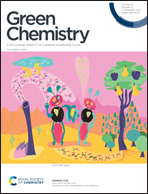Catalytic cascade vapor-phase hydrotreatment of plastic waste into fuels and its sustainability assessment†
Abstract
The COVID-19 pandemic impacted the world through the anguish from a fast-spreading virus and by struggling with the increasing plastic waste. A catalytic cascade process where hydropyrolysis was coupled with downstream vapor-phase hydrotreatment was employed for the first time to upcycle real-world mixed plastic waste into drop-in fuels. This tandem vapor-phase hydrotreatment technology is feedstock-agnostic and therefore capable of upcycling different kinds of personal protective equipment (PPE) plastic waste into drop-in fuels over a non-noble bifunctional Ni/NiAl2O4 catalyst. A maximum 88.9 wt% single-pass yield of drop-in fuel-range hydrocarbons was obtained with a hydrotreatment temperature of 300 °C at 0.3 MPa H2. Life cycle assessment showed that this catalytic cascade vapor-phase hydrotreatment approach had a high energy efficiency of 94%. The global warming potential of the obtained fuel could be reduced by 72% as a maximum in the low carbon future, compared with conventional fuel blends, indicating that it can be used as a promising chemical upcycling technology for achieving a sustainable plastic circular economy.



 Please wait while we load your content...
Please wait while we load your content...